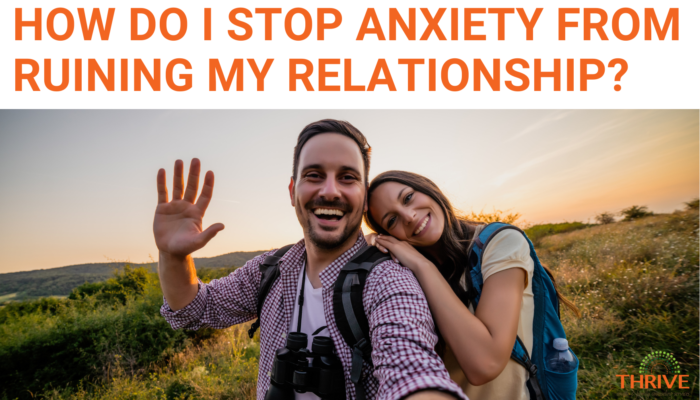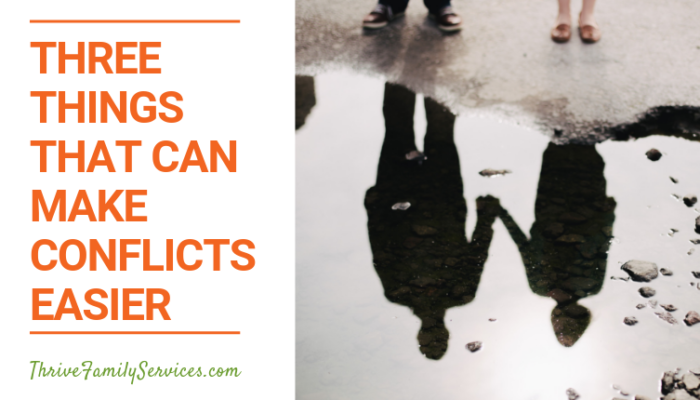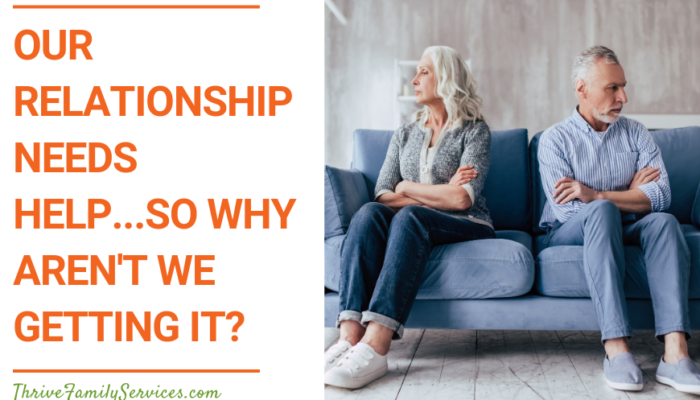Have you ever felt like anxiety was ruining your relationship? While everyone feels anxious from time to time, some people experience intense anxiety that can impact every aspect of life, including romantic relationships.
Anxiety is incredibly common, so it’s helpful to know how to protect your relationships so anxiety doesn’t take away from the most important thing in your life, the relationships with the people you love. The great news is, anxiety is very treatable.
Where Does Relationship Anxiety Come From?
It can be scary to feel anxiety around your relationship, and understanding where it comes from can help you have compassion for yourself and for your partner. Understanding your partner’s attachment style and history can give you important insight into why they do the things they do.
Sometimes, anxiety can develop from the way our caregivers modeled anxious coping strategies as we were growing up. We absorb a lot as youngsters, and the way our caregivers approach relationships is something that many kids pick up on. When the only types of relationships you’ve seen modeled are ones based on anxious attachment, it makes sense that you could experience a lot of anxiety in relationships.
Other times, relationship anxiety can develop from a history of relational trauma. It makes sense that someone would feel anxious about getting hurt in a relationship if they’ve been hurt in the past, especially by others who should have been a source of security and love. If you’ve had to learn to protect yourself and keep your guard up, or remain watchful when the world has taught you relationships aren’t safe, it can feel terrifying to get close to someone again.
Lastly, generalized anxiety that maybe has nothing to do with relational coping or trauma can still affect your relationships. Anxiety is incredibly common, and come in many forms such as social anxiety, phobias, obsessive-compulsive disorder, and panic disorder, just to name a few. These individual struggles very much impact relationships, and it’s helpful to treat them and learn how to protect your relationships if you struggle with one.
How does anxiety impact relationships?
When it comes to relationships, anxiety can take a toll. It’s hard to stay in the present moment when you’re caught up in anxiety. Anxiety causes us to ruminate about the past, or worry about the future, and often both.
This difficulty of being engaged in the present moment can make it hard to engage with your partner on a deep level. When you’re experiencing frequent worrying thoughts, it can be hard to concentrate on what you’re doing or what your partner is saying. This disconnection can lead to your partner feeling like you don’t care about what is going on for them, or that you don’t really hear or see them.
Instead of enjoying the moment, anxiety has you on edge, which can make it hard to feel close to someone. It’s not fun to have anxiety, and it causes suffering. That internal suffering can sometimes block you from sending those positive signals of joy and appreciation that everyone longs to feel from their partner.
Anxiety can also lead to miscommunication or misunderstandings.
One of anxiety’s little tricks is to make you feel like everything is urgent, which can lead to communication difficulties and even increased arguments. It might also make you feel like you can predict what someone else is thinking or feeling, or even how they’ll act. You can really get into trouble in relationships when you rely on assumptions and mind-reading your partner rather than sharing your concerns and learning more about what your partner is actually thinking and feeling.
Anxiety is a lot like a bully in your mind. Anxiety knows that if you slow down and use your coping skills, you’ll realize that what it’s telling you is false, so it tries to get you to act quickly, before your logical mind sets in. Anxiety also tells you lies, like if you don’t come up with all the possible what-ifs in a situation, something bad might happen.
What can I do to stop anxiety from ruining my relationship?
Anxiety is distressing, but it doesn’t mean that your relationship is doomed. There are things you can do to stop anxiety from ruining your relationship. Here are 6 ways to approach relationship anxiety:
Communicate like it’s your job
Anxiety is tricky. It tries to convince you to act with urgency or assume you can predict other people’s behavior and emotions. The truth is, we can’t predict other people. That’s true for you, and it’s true for your partner. When something is causing you distress, it’s important to communicate what’s going on. Nothing can be done to improve your relationship if one of the parties doesn’t know what’s going on.
It can be hard to find the words to describe anxiety. If that is the case for you, try to explain the body sensations you feel when you’re anxious. It might be easier to illustrate how you feel with a gif or a clip from a tv show that you relate to. Even if you don’t think you’re explaining it well, even just the act of trying to be open and vulnerable with your partner can help you feel closer to one another. Instead of feeling like you’re pitted against one another, you can work together to find solutions.
Understand your anxiety triggers
Do you know what in particular triggers your anxiety? The more you investigate your anxiety, the more tools you’ll have to cope when it comes up. When you understand what your anxiety triggers are, you can learn to anticipate when anxiety will come up for you and be proactive about managing it.
Of course, sometimes anxiety comes up for no reason at all, but if there are certain things that make you feel more anxious than others, it’s worth doing a little digging to see what the common triggers are.
Understand your own and your partner’s attachment style
In Emotionally Focused Therapy (EFT), one of the ways we view things is through the lens of attachment theory. Attachment theory describes how our childhood experiences influence our adult relationships. We use attachment to help regulate emotions, feel safe, and even to keep us alive. An attachment style is the approach someone uses to feel close to their attachment figure. Depending on the experiences you and your partner had in your childhoods, you may have developed different attachment styles.
The more you understand about attachment styles, both your own and your partner’s, the easier it will be for you to see where they’re coming from.
Often underneath the arguments and the negative cycle is an unmet attachment need, like believing that you matter to your partner. When you understand why they do the things they do, it is easier to separate their actions from the negative beliefs you hold about yourself. We all have an inner critic or an inner dialogue that says every snarky, mean thing you think about yourself. When we don’t understand why our partners act a certain way, it’s easier to assume that it’s something personal about you, when that is likely not the case at all.
Check for cognitive distortions
The things that anxiety tells you aren’t always true. Cognitive distortions are patterns of thinking that are negative and often inaccurate. An example of a cognitive distortion is all or nothing thinking. Instead of seeing things with nuance, all or nothing thinking forces you to sort the world into extremes:
- You’re either a success or a failure.
- You’re good or bad.
- Your partner either prioritizes you, or they don’t.
- They either care about what you feel, or they don’t.
Even when partners are struggling to respond in connecting ways to one another, they are rarely feeling only one thing at a time. We are all way more nuanced and complicated than that.
Since cognitive distortions are habitual ways of thinking, it can be hard to notice and break the habit. The first step is to try to spot cognitive distortions. When you’re in distress, ask yourself if your thoughts are true, or if this is a negative pattern of thinking.
Check in to see if you are having anxious thoughts and physical sensations in multiple parts of your life. That’s a telltale sign there’s some anxiety impacting you, and likely your relationship.
Find another outlet for your relationship anxiety
It’s normal to feel anxious about things that are important to us from time to time. Relationships are particularly important to us because humans are social creatures. We need emotional connection from birth – it’s literally a matter of life and death. It makes sense that something with that level of significance can lead to some big feelings.
While it’s crucial to communicate with your partner, especially when relationship anxiety is in the mix, it’s not necessary for your partner to provide you constant reassurance about your anxiety. It can be overwhelming for a partner of someone with anxiety when their loved one needs constant reassurance.
For some people, it feels like their partner doesn’t believe them when they need to keep asking the same thing over and over again. If that’s the case for your partner, or if they have other concerns, see what you can do to get help and learn tools to manage anxiety.
Anxiety thrives in people who suppress their feelings and avoid conflict.
Make an intentional effort to share with your support system what is really going on with you. Ask a friend if they have time for a vent session.
If expressing your feelings to someone else proves difficult for you, this is a good sign some therapy will help. Make an appointment with a therapist who can help you begin to talk about the things you may try to avoid or suppress, and help you learn tools to manage anxiety.
This is not to say that you can’t ask for reassurance sometimes or even talk to your partner about how important reassurance and affirmation is to you. It just means that you don’t have to ask every single time the anxious thoughts pop up.
Anxiety may also cause you to make meaning of a situation that is not true. Can you check in with yourself, and better yet, with your partner to share with them you are feeling anxious and it’s causing you to have some worried thoughts?
Embrace vulnerability
Being vulnerable is hard, but it can also bring you and your partner closer together. It can be tempting to avoid being vulnerable in relationships you’re anxious about, because the idea of being rejected is painful. It can sometimes feel scary to admit that there’s something going on that you’re struggling with, but letting your partner in on what’s going on with you can help them understand you on a deeper level.
Anxiety causes us to think of the worst case scenarios, especially when it comes to taking risks in relationships to be vulnerable.
What will happen if you’re vulnerable? Anxiety says you may be rejected, abandoned, or heartbroken. Perhaps you’ve had past experiences of getting hurt, so it makes sense when fear comes up for you.
As relationship specialists, we can tell you that taking a risk to be vulnerable in your relationship most often leads to closeness and stronger relationships. You and your relationship are much more resilient than you give credit for.
How Can I Help My Partner With Anxiety?
It can be distressing to see your partner struggle with anxiety. Instead of viewing the situation as You versus Your Anxious Partner, remember that you are on the same team. It can be Us versus Anxiety.
Practice externalizing the anxiety, which can also help prevent you from taking your partner’s anxiety personally. Anxiety is not something the sufferer can control – if they could, they’d never choose to feel this way!
While it can be hard to hear that your partner is feeling anxiety around your relationship, remind yourself that it’s not necessarily about anything you’ve done or haven’t done.
While you didn’t cause the anxiety, you can support your partner as they work through relationship anxiety.
You can learn to do things together that help decrease the level of anxiety your partner experiences. Try things like breathing, meditating, and exercising together.
Another helpful coping skill is to learn how to recognize when thoughts are cognitive distortions. A cognitive distortion is a habitual belief or way of thinking, which is often not true and negatively biased. There are many different types of cognitive distortions, so learning how to tune into your inner dialogue can help you notice those unhelpful patterns of thinking.
Worrying can get out of control quickly, so it might be helpful to set aside a specific time of day to focus on worries. When you notice yourself worrying at other times in the day, remind yourself to save it for Worry Time and practice refocus your thoughts on something else. When that time comes around, you can discuss your worst case scenarios and put a voice to your fears. Giving yourself a set time to focus on worry can help prevent it from spiraling to the point it consumes your entire day.
You might not always know exactly what to do to support your partner through anxiety, but when you rely on each other, you can develop healthier coping strategies as a team.
Are you concerned about the role anxiety plays in your relationship?
Working with an Emotionally Focused Therapist can help you notice your patterns, find new ways to cope, and learn new ways to approach communication. Get in touch with our Centennial counseling office to schedule an appointment today.




